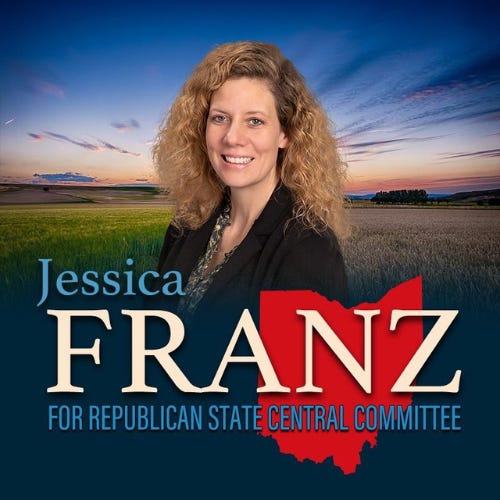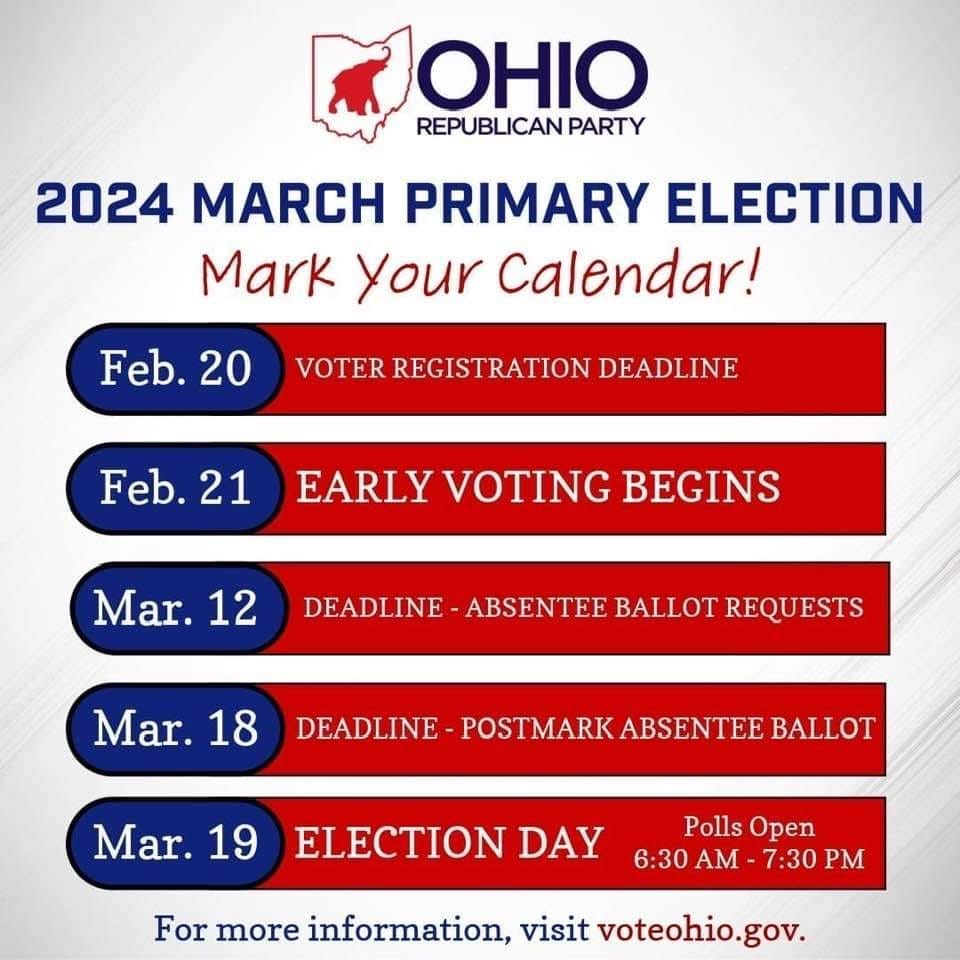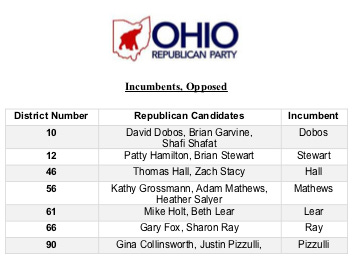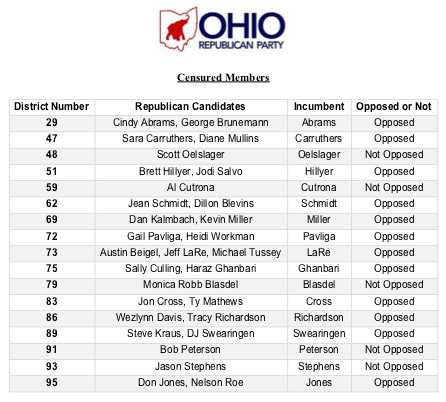March 19 Primary Election, Endorsement Policy Subcommittee Report, ORP Meeting Summary, and Quid Pro Quo Concerns!
Dear Valued Ohio Voter,
I am seeking re-election to the Ohio Republican State Central Committee (ORSCC), District 5, the governing board of directors for the Ohio Republican Party (ORP). The committee was established to empower YOU, not party bosses, in determining the direction and priorities of the Ohio Republican Party.
I am a grassroots-focused, citizen candidate committed to conservative beliefs and Republican values.
I am not part of the establishment.
I am not appointed by DeWine or any statewide official.
I am not receiving compensation or favors for committee service.
I am asking you to vote for me on March 19, 2024, in the Republican Primary and to consider supporting my campaign with a monetary contribution.
Facts and Accomplishments:
Christian, wife, and mother of six.
Constitutionalist, fiscal conservative, small business owner, and lifelong learner.
Pro-life, Pro-Second Amendment, Pro-family, and Pro-freedom.
Certified teacher with the Institute on the Constitution, homeschooling for 16 years.
Holds a degree in English and a bachelor's degree in Political Science from Liberty University.
Serves as a board member with Ohio Stands Up.
Author of Update from Jess Franz ORP SCC 5 newsletter.
Endorsements and Support:
Dayton Right to Life Society; Ohio Gun Owners; Turning Point Action; David Geiger, President of Miami County Right to Life; Mary Ellen Beuchter, President of Miami County Liberty; Jerry Poff, Businessman, Entrepreneur, and President of Dayton Citizens for Truth; Restore Liberty; Ohio Republican PAC; Miami County Republican PAC; and Montgomery County Republican PAC.
Supported by Grassroots Freedom Initiative, National School Board Leadership Council, and Ohio Patriots Alliance.
Conservative Record:
Opposed changes to Title IX.
Advocated for ORP to become a Pro-Life Party.
Co-sponsored Resolution to Censure the Blue 22.
Supported Legislation Requiring 60% to Amend the Ohio Constitution.
Advocated for Fairness and Transparency in Committee Resources Access.
Supported Partisan School Board Races.
Urged Passage of HB 68 SAFE Act and HB 8 Parents Right to Know Act.
Opposed Ohio Right to Reproductive Freedom Amendment (Issue 1).
Protected the Sanctity of Life for the Pre-born in Ohio.
Co-Sponsored Resolution to Condemn Hamas and Antisemitism Globally.
Opposed Recreational Marijuana Legalization (Issue 2).
Supported Legislation to Prohibit Mask Mandates.
I remain steadfast in my commitment to Republican Party principles, bringing accountability to candidates, and opposing party endorsements in the primary. I am dedicated to protecting the unborn, with life beginning at conception.
On March 19, 2024, your vote will decide whether YOU or PARTY BOSSES are calling the shots! Please visit my website at Jessica Franz for ORSCC and mark your calendar to vote in the Ohio Primary on March 19, 2024.
Thank you in advance for your time and attention on this matter.
Sincerely,
Jessica Franz
Ohio Republican Party State Central Committee, Senate District 5
(937) 499-4435
Ohio Republican Party Endorsement Policy Review Subcommittee Meetings Report
The Endorsement Policy Review Subcommittee held two meetings before our January 27th Republican State Central Committee to establish a proposed endorsement policy guideline for House and Senate candidates under consideration for endorsement.
During our initial meeting on January 12 via Zoom, Tony Schroeder (District 1) and Dave Johnson (District 33) supported discussing a pledge that would essentially offer a pathway for Blue 22 members to receive endorsement. If you are unfamiliar with the Blue 22, please refer to my article titled “The Gang of 22 (aka, ‘Stephens 22’).”
The pledge was described as a document that Blue 22 members could opt to sign, expressing regret for their actions and a commitment to refrain from repeating them.
Shortly before our second scheduled Endorsement Policy Review Subcommittee meeting on January 19th, I still had yet to receive a draft of the proposed pledge. With several reservations about the proposed pledge, I decided to reach out to the endorsement policy review committee members to express my concerns in advance of our meeting.
Dear EPR Subcommittee Members,
I trust this message finds you well. In light of our recent meeting and in anticipation of our discussion on endorsement guidelines this morning, I would like to share my perspective on Tony Schroeder's proposed pledge for Blue-22 legislators.
I want to make it unequivocally clear that I am not and do not intend to support the endorsement of Blue-22, even with the inclusion of a pledge. I align with Ron Maag's viewpoint that there should be consequences for their actions, and I believe that issuing censure and withholding endorsement adequately reflects the gravity of their behavior.
Additionally, I agreed to a second meeting with the intention of providing the subcommittee ample time to acquaint themselves with the candidates. However, my intention was not to afford Mr. Schroeder the opportunity to draft and garner support for Blue-22 members. It is disheartening that the subcommittee did not receive the candidate list in advance, a crucial step in our preparation for the meeting.
Upon reflection, I am disappointed that the second meeting might have been orchestrated to enable Tony to draft the pledge and lobby support, rather than offering us a genuine opportunity to learn more about the candidates. I am troubled by the apparent recurrence of having only one person drafting this pledge, reminiscent of the situation with the bylaws subcommittee when Mr. Schroeder drafted the bylaws with the guidance of Mr. Johnson. Furthermore, I am puzzled as to why Mr. Schroeder, who doesn't have Blue-22 members within his district, is the designated individual to draft the pledge.
I look forward to addressing these concerns during our upcoming meeting and collectively ensuring the integrity of our endorsement process.
Best regards,
Jessica Franz RSCC District 5 EPR Subcommittee Member
At our second Endorsement Policy Guideline Subcommittee meeting on January 19th, the subcommittee decided to categorize the proposed candidates into 5 categories for consideration and opted to separate the Blue 22 members for independent consideration for endorsement.
The five categories were:
1) Uncensored incumbents (opposed and unopposed)
2) Unopposed non-incumbents
3) Opposed non-incumbents (open seats)
4) Censured incumbents unopposed
5) Censured incumbents opposed
Chairman Triantafilou, alongside members Tony Schroeder (District 1) and Ron O’Brien (District 25) raised concerns regarding the potential implications of implementing a pledge. Triantafilou acknowledged that if such a pledge arose organically from the members, it might have merit. However, he cautioned that if initiated by the party, it could potentially violate Ohio law by appearing as though the party were demanding concessions from a governmental entity in exchange for financial benefits.
Joe Miller (District 21) noted that he had issue with the party asking censured candidates to sign a pledge because they hadn't expressed remorse for their actions.
Following this, Shannon Burns (District 24) proposed a motion to amend the policy so that candidates who had been censured within the last two years would require a two-thirds majority vote for endorsement, regardless of incumbency status.
Chairman Triantafilou then facilitated discussions on Burns' proposed amendment.
Arthur McGuire (District 6) expressed his support for changing the endorsement threshold for the Blue 22 from a simple majority (50% +1) to a two-thirds majority of the full committee body. He contended that our party has been infiltrated by Republicans who are not really Republicans and pointed out the serious policy implications of the actions taken by the Blue 22. He opposed the idea of a pledge and supported continued censorship without endorsement under any circumstances.
In contrast, Melanie Mason (District 24) argued against raising the endorsement threshold to two-thirds. She pointed out that the Blue 22 did ultimately vote for a Republican as Speaker of the House, albeit not the one preferred by the Caucus. Mason defended their actions and argued for redemption for the censured members, emphasizing the importance of unity within the party and the overarching goal of defeating Democrats in elections. Mason argued that despite ideological differences within the Republican Party, individuals may hold more moderate or far-right views, but regardless of this, they still remain Republicans.
Brian Andrews (District 23) aligned with Melanie’s viewpoint, pointing out that 16 of 17 Blue 22 members overrode DeWine’s veto on HB68. He argued that without their vote, they wouldn’t have gotten the override. He stressed the importance of keeping our job in mind, which he stated was expanding the Republican Party in Ohio.
Dave Johnson (District 33), echoing the sentiments of Mason and Andrews, claimed there were three factions in the Caucus that were vying for leadership and collaborating with Democrats, albeit to a lesser extent than the Blue 22. He stated his focus was on winning elections and defended certain members of the Blue 22, describing them as good conservatives deserving of support. He asserted he was not in favor of blindly condemning them, and argued the Committee’s purpose was to win elections, not pass litmus tests.
Curt Braden (District 29), in agreement with Johnson, stated that if the party starts pulling litmus tests, it will cause a problem because we need to be a bigger tent in order to win. Referencing Mason’s remarks regarding the duration of penance for the Blue 22, Braden contended that there were plenty of conservatives on the Blue 22 list. He suggested that another solution could be to shun them, comparing it to the Amish community’s practice, by showing no action for or against them and allowing them to fend for themselves.
Chairman Triantafilou ended the discussion. Johnson moved to adopt the original policy as presented and Melissa Pope (District 32) seconded the motion.
Shannon Burns (District 24) proceeded with proposing an amendment to the motion, suggesting that if the candidate under consideration for endorsement had been censured within the last two years, the endorsement threshold for that candidate would be set at two-thirds, regardless of their incumbent or non-incumbent status. This proposal was seconded by Joe Miller.
Chairman Triantafilou then opened the amended motion up for discussion.
Joe Miller (District 21) stated the importance of maintaining a strong precedent with the censured members, advocating for stringent guidelines and avoiding any wavering or backsliding.
Melanie Mason (District 24) expressed concerns about penalizing individuals for past actions, questioning whether the Blue 22 members should be defined by a single mistake. She hesitated to label their actions as worthy of this type of punishment and stated that there are good Republicans among the Blue 22 and that the Committee is punishing all of them because of what they did -what we [the Committee] are perceiving as their mistakes. Melanie opposed the proposed move to require a two-thirds vote for endorsement, fearing it would create division and likening it to a circular firing squad. She reiterated the need for unity under one umbrella, stressing that the true enemy isn’t ourselves, but the Democratic Party.
I spoke up in full support for the higher two-thirds threshold, deeming it entirely appropriate. I referred to prior comments made by Ron Maag that there were consequences for bad actions. Furthermore, I stated that the Blue 22’s decision to side with Democrats was purposeful and deliberate, and they clearly understood what they were doing. I concluded by stating that their betrayal of Republican voters and the party necessitated consequences, rendering the proposed higher threshold entirely appropriate.
Ron Maag (District 7) stated that Blue 22 members diminished the House by voting against their constituency, caucus, and the party. He also commented that censorship is good, but if there are no consequences, then everyone will do it again. He expressed his support for raising the threshold to two-thirds.
Dave Johnson (District 33) expressed his opposition to the proposal. He commented that some members of the Blue 22 are outstanding legislators that are being opposed by people that would be lousy legislators. He described the challengers of the Blue 22 members as the kind of radicals that would get nothing done but would make headlines. He concluded by stating that he was in the business to win, and he was not going down on a ship screaming about abortion the whole way down.
Lauren Bowen (District 9) agreed that the Republican Party in Ohio encompasses a “big tent,” citing Trump’s significant victory margin in Ohio in 2020 and predicting a similar outcome in the future. She asserted that under a big tent, accountability is important. She stated that while winning elections is important, so too is holding politicians accountable when they betray their constituents. Bowen stated that the Blue 22 members betrayed both the party and their own co-workers by going back on their word. She pointed out that if you follow the money, you can see who the members were in bed with. Many of them took money from teachers’ unions, but all of them took money from government unions. Bowen expressed her support for the two-thirds threshold as a means of reinstating the necessary level of accountability within the party.
From the Zoom chat box, Gloria Kirker (District 14) argued that the Committee would have to amend the bylaws to adopt the policy, but Shannon Burns explained that our bylaws allowed for the subcommittee to put forth a proposed endorsement policy that the full body of the Committee could choose to adopt or not at the January 27th Committee meeting.
The Chairman ended the discussion and called for the vote. The motion to raise the threshold to two-thirds passed with a narrow margin of 10-9.
The following members voted to raise the threshold to endorse censured Blue 22 candidates from a simple majority (50% +1) to two-thirds of the Committee:
Ron Maag (District 7)
Shannon Burns (District 24)
Jessica Franz (District 5)
Jim Burgess Sr. (District 3)
Tony Schroeder (District 1)
Lauren Bowen (District 9)
Lucy Stickan (District 21)
Arthur McGuire (District 6)
Judy Westbrock (District 6)
Zoi Romanchuk (District 22)
The following members voted NOT to raise the threshold to endorse censured Blue 22 candidates from a simple majority (50% +1) to two-thirds of the Committee:
Dave Johnson (District 33)
Melanie Mason (District 24)
Brian Andrews (District 23)
Gloria Kirker (District 14)
Ron O’Brien (District 25)
Dan Carter (District 18)
Melissa Pope (District 32)
Curt Braden (District 29)
Debbie Lang (District 4)
Ohio Republican Party State Central Committee January 27 Meeting
During the Republican State Central Committee meeting on January 27th, the committee convened to consider state legislative endorsements.
The first category of candidates consisted of 24 individuals, all non-incumbents, who faced no opposition. Following discussion, the committee collectively voted to endorse all of these candidates as a unified slate.
The second category consisted of 29 unopposed incumbents. The committee collectively voted to endorse all of these candidates as a unified slate.
The third category included 28 non-incumbent candidates facing opposition. The committee opted not to endorse due to a lack of familiarity with the candidates.
The fourth group was comprised of 16 incumbents contested in their districts. Each incumbent was individually voted upon. With the exception of Adam Matthews, Sharon Ray, and Justin Pizzulli, all incumbents received endorsements. District 10 was excluded from consideration after it was revealed that the incumbent, David Dobos, withdrew from the race following his misstatements regarding his MIT degree.
The last group consisted of censured incumbents, all belonging to the Blue 22. None of these Blue 22 incumbents received endorsements, nor were endorsements made for their challengers.
After wrapping up endorsements for House members, the committee reviewed three categories of Senate candidates. The initial category comprised unopposed non-incumbents. The committee decided to endorse all non-incumbents within this category.
Following substantial discussion and heated debate, a motion was proposed to remain neutral on the two incumbent candidates vying for the open seat in District 10. Consequently, no endorsements were issued.
The final category focused on a censured unopposed member from Blue 22 in District 24. The Committee decided against endorsing Tom Patton.
Ohio Republican Party Jan. 27th Meeting Summary
The following post was shared to my Facebook Page following the January 27th meeting.
Good News! Successful Opposition to Blue 22 Endorsements!
A big thank you to everyone who called their Ohio Republican Party State Central Committee members, urging them not to endorse the Blue 22. As a member of the Endorsement Policy Review subcommittee, I was one of the members who spoke against Blue 22 endorsements. Our calls-to-action, along with voter pressure, worked!
At Saturday's meeting, members such as Dave Johnson, Melanie Mason, Tony Schroeder, and others, who were initially strong advocates of the Blue 22, changed their stance and voted against endorsements. The Committee ultimately decided not to endorse any Blue 22 members, including their accomplices, Sharon Ray, Justin Pizzulli, and Adam Matthews.
Challenges Persist: Is the Party Working Against Conservatives?
Despite these victories, I received information from an insider that some of the chairman's campaign staff had been donated as in-kind contributions to statewide candidates such as DeWine, Husted, Faber, and LaRose and were being used to make phone calls on behalf of the opponents of conservative members of the state central committee.
During the executive session, which is not open to the public, I challenged the Chairman about allegations that party funds and staff were being used against conservative State Central Committee members, including myself. I informed him that I reportedly had up to 5 staffers making calls on behalf of my opponent.
I explained how this was a violation of our bylaws, and I sought reassurance that this was not happening. Unfortunately, the Chairman evaded the question and refused to provide assurance. Several committee members reached out to him after the meeting via text to gain reassurance, but the chairman did not respond. In my view, the omission of any reassurance confirms that these activities are indeed taking place.
Quid Pro Quo? Say it Ain’t So!
In my situation, I was informed by both local and state party insiders that the Husted Team was allegedly working to recruit opponents for conservatives on the committee, with my primary challenger reportedly being handpicked for the role. But why? The answer seems straightforward: my outspoken opposition to primary endorsements. I campaigned on a platform of not endorsing in the primaries, as I firmly believe in allowing the voters in my district to make their own decisions without any interference from me.
Several months ago, a representative from the Husted team began calling me, with follow-up calls every few weeks. One of my final calls was from Husted himself, requesting my support for his 2026 Gubernatorial race. At the time, I was deeply immersed in efforts to educate voters about Issues 1 & 2. I explained my focus to the Lieutenant, and explained that it took precedence over the 2026 race. In response, the Lieutenant mentioned being occupied with making phone calls to raise funds for Issue 1. Reflecting on this now, I wonder about the extent of his efforts, given that the party only managed to raise $99,516.77 to oppose both Issues 1 and 2.
Additionally, I made it clear that I wouldn't be endorsing in the primaries, leaving the decision to my voters. As expected, the calls dwindled soon after, and it wasn't long before I discovered I had a challenger.
For those who may not be familiar, this is the longstanding tactic of establishment candidates. They strategically place “their people” on the committee to secure endorsements, thus obtaining the party's endorsement and access to its resources and funds. In return for their loyalty, these handpicked committee members often receive perks such as prime subcommittee assignments, special treatment, appointments to executive boards, exclusive invitations to parties and events, and more.
Purpose of the Ohio Republican State Central Committee
The Republican State Central Committee was created so that YOU, and NOT PARTY BOSSES, would determine the PRIORITIES and DIRECTION of Ohio's Republican Party.
On MARCH 19th, your vote will determine whether YOU or PARTY BOSSES call the shots.
I humbly ask for your vote on March 19th, so that I can continue representing the voice of Republican voters in District 5. If you would like to make a donation to my campaign, you can contribute via my GiveSendGo page or by writing a check to:
Jessica Franz
4285 US Route 40
Tipp City, Ohio 45371.
In my Upcoming Newsletter…
DeWine’s Veto of House Bill 68 and Subsequent override by the House and Senate
Ohio's Intel Investment: Economic Boost or Political Maneuvering?
First Energy Scandal Updates
Letter to the ORP Treasurer & Assistant Treasurer
Speaker Jason Stephens reportedly using OHRA funds to attack Republican candidates in the primary election
Thank you for your continued encouragement, prayers, and support. May God continue to bless you, to keep you, to make His face shine upon you, and to give you His peace. Numbers 6:24-26
Sincerely,
Jessica Franz
Ohio Republican Party State Central Committee District 5
.













Hi Jessica! You and I are presenting on Saturday! Reach out please to coordinate our efforts